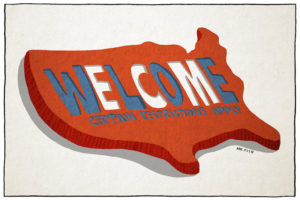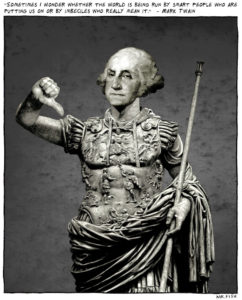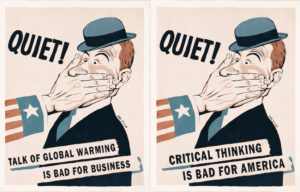Arithmetic Is on China’s Side
Even before Donald Trump, the Asian giant was chipping away at U.S. dominance. A woman shops for chicken at a supermarket in Beijing in May. (Mark Schiefelbein / AP)
A woman shops for chicken at a supermarket in Beijing in May. (Mark Schiefelbein / AP)
Some 30 years ago, I took a bullet train from the airport in Shanghai to the center of that city. I was being hurled ahead at 268 miles an hour on a thin layer of air between the train and the magnetized narrow tracks. But that was not what fueled my disbelief. Far more disconcerting was what I saw outside the window when we slowed down: Some of the peasants—knee deep in rice paddies—were talking on cell phones.
Entering the telecommunications age with satellite-based platforms, the Chinese were able to leapfrog over the expensive cable-based systems in the West. Currently, over 75 percent of its 1.3 billion-plus people have at least one cell phone.
Even before Donald Trump forfeited the United States’ place at the global table, China—the world’s largest nation with a self-appointed government that seeks access to global markets and resources—has been chipping away at the edifice of America’s dominance. As of May this year, the U.S. debt to China was $1.102 trillion, which is 28 percent of the $3.9 trillion in Treasury bills, notes and bonds held by foreign countries.
China’s state-owned firms have sought out iconic Western companies for direct investment, taking stakes in Greece’s largest port, Portugal’s biggest power plant, London’s Heathrow Airport and Canada’s energy giant, Nexen. These are only a few of the Asian country’s investments in an unprecedented range of overseas deals projected to be worth between $2 trillion and $3 trillion by 2020.
The Chinese government has built other countries’ infrastructures, and it has made loans to nations hobbled by deficit. To add to this outreach, China is spending billions of dollars a year in the most extensive program of image-building the world has ever seen.
There was a time when Westerners—Americans in particular—thought that the Chinese would convert to Western ways. But China has not become more like us. Indeed, it would be an understatement to say that China stage-manages the exposure of Western ideas to its citizens. So, no, the Chinese do not intend to become like us.
Chinese culture—formed over 2,500 years—embraces a Confucian perspective, which is in stark contrast to the linear rationalism attributed to Western belief. Confucius’ Analects (sayings) concentrate on the practical rather than the theoretical. They advise against reducing morality to a universal truth. Unlike the West, where Judeo-Christian ethics designate a non-negotiable right and wrong, the Chinese do not adhere to absolutes. Since China comprises 20 percent of the planet’s population, one in five people in the world believes there is no single way of being wrong and many ways of being right.
Where does that leave the rest of us?
We in the West would like to believe that individual freedom determines our choices, but in reality we are ruled in large part by the prevailing time in which we live, and our world today is interconnected. Like it or not, we must confront a challenging question: What will anchor us in our own distinct beliefs and ethics while respecting other distinct cultures with different ethical and political systems?
To consider this, we’ll need to take our eyes off the mirror in front of us and look at people with different truths and values, because only then will we be able to make the difficult decisions. At times, those decisions will require us to relinquish some part of our ground. At other times, they will call on us to protect the ground we are determined to hold. It will be these hard-won decisions—not the false promises of politicians—that will enable us to navigate the future of our conflicted, crowded world.
Your support matters…Independent journalism is under threat and overshadowed by heavily funded mainstream media.
You can help level the playing field. Become a member.
Your tax-deductible contribution keeps us digging beneath the headlines to give you thought-provoking, investigative reporting and analysis that unearths what's really happening- without compromise.
Give today to support our courageous, independent journalists.





You need to be a supporter to comment.
There are currently no responses to this article.
Be the first to respond.